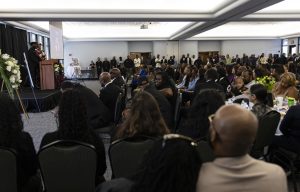One Book looks at internment camps
March 19, 2009
The One Book Program, which brings the campus community together through a book and explores diverse cultural perspectives, selected “When the Emperor was Divine” by Julie Otsuka for students and faculty to use in the fall 2009 semester.
“When the Emperor was Divine” is a fictional novel that tells the story about a Japanese-American family in an internment camp in World War II. Otsuka based the story on her family’s real life experiences in Japanese-American internment camps. The story paints a vivid portrait of the family enduring separation from the rest of the world and living through harsh conditions.
Sheree Meyer, One Book faculty coordinator, said that she was struck by how beautifully written the novel is. She said it’s a powerful story about a family coping with their separation from their home and father.
“If we scratch the surface, all of our families have stories to tell-important stories for us to record and remember,” Meyer said.
The book was chosen by a 10-person Book Selection Committee that includes representatives of the program, faculty, staff, students and the community.
The committee discussed a variety of books and reviewed them based on the quality of writing, treatment of contemporary issues, and whether or not the book will encourage thought and spark discussion in a variety of courses.
Meyer said that one factor that emerged in favor of “When the Emperor was Divine” was the number of resources available on campus and in the community which related to the book.
Resources such as the Sokiku Nakatani Tea Room located in the University Library help students experience Japanese art and culture through activities like tea ceremonies.
Sally Hitchcock, library outreach coordinator, discussed how the Tea Room can be a resource for students to observe and participate in Japanese cultural activities.
Hitchcock said that she listened to a lot of stories from Japanese-Americans who experienced injustices during World War II.
“(The book) was very eye opening. I became very aware of what they went through,” Hitchcock said.
Meyer said that most students who read the book will not have an immediate connection to the specific experiences.
“So, on the one hand, it will introduce students to a subject with which they may not have any first-hand experience; on the other hand, though, the issues raised by the book can be applied to a wide range of current personal and political situations,” Meyer said.
Sheila Macias, Community Engagement Center administrative director, said that the novel was a small book, but easy, yet powerful read.
“I can strongly visualize, though I read over four months ago. I also believe there is much in ‘When the Emperor was Divine’ that is relevant to today’s social and political environments,” Macias said.
The One Book Program selected “Funny in Farsi: A Memoir of Growing Up Iranian in America” by Firoozeh Dumas for the fall 2008 first-year students.
Julie Otsuka is going to visit Sacramento State on Oct. 5 and give a morning lecture to first-year students and answer their questions.
Catherine Robledo can be reached at [email protected].
























































































































